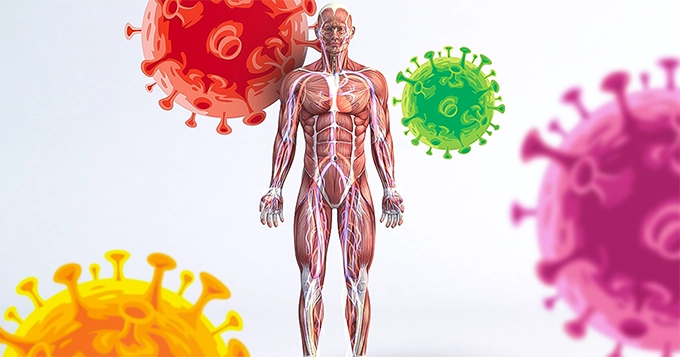Immune System Overview
The immune system provides the body’s defense against infection. It is a complex network of cells, organs, and proteins that safeguard the body’s cells. Every germ (microbe) that your immune system has ever eliminated is recorded, allowing it to promptly identify and eliminate the microbe if it enters your body again.
Thus, understanding how the immune system works is essential for comprehending how our bodies defend against infections and diseases.
Your immune system is working right when:
When your immune system function works properly, it acts as a defender that knows which organisms belong in your body and which do not. It fights and eliminates harmful germs that invade your body. At the same time, it also learns about these germs upon exposure, so it can create germ-specific antibodies – the body’s defense mechanisms.
Sometimes, when you’re sick, doctors might give you antibiotics to help your immune system. But they only work against certain bacteria, not viruses.
Your immune system is not working right when:
When your immune system fails to successfully fight off an intruder, a problem, such as an infection, develops. Additionally, your immune system may occasionally launch an attack on your body even when there is no invader or continue to do so even after the invader has been killed. Allergies and autoimmune illnesses are conditions brought on by these behaviors.
How to Improve Your Immune System
Get enough sleep
Lack of sleep can weaken the immune system.
According to some studies, people who don’t get enough quality sleep are likelier to become sick after contracting a virus such as the common cold virus. And if you do become ill, lack of sleep may slow down your recovery.
Your immune system produces proteins called “cytokines” while you sleep, some of which aid in sleep promotion. It is necessary for some cytokines to rise when you have an inflammation, an infection, or when you’re stressed. And lack of sleep may result in less of these protective cytokines being produced.
Eat more healthy fats
There is growing evidence that getting enough good fats in your diet can help maintain the health of the lining of the gut. The lining of the gut plays a very important role in various metabolic functions, including the absorption of nutrients, maintenance of the gut microbiome, and immune function.
Eat fruits
The majority of citrus fruits, including oranges, grapefruits, tangerines, lemons, and limes, are high in vitamin C, which is thought to boost your white blood cells and aid in the battle against infection.
Eat vegetables
Vegetables are rich in antioxidants, fiber, vitamins, and minerals, all of which are essential for a stronger immune system.
Eat more fermented foods
Your immune system is greatly impacted by the bacteria in your gut. Because of their high probiotic content, fermented foods such as yogurt, kombucha, and aged cheeses can strengthen your immune system and lower your risk of infections.
Live microorganisms called “probiotics” can improve health, whether consumed or applied topically.
Limit added sugars
Studies have linked a weakened immunological response to high blood sugar levels. Limiting your intake of sweetened meals and drinks can improve your immune system’s function and blood sugar control.
Engage in regular exercise
Exercise can encourage the immune system’s utilization of white blood cells, allowing it to spread to more locations where viruses and bacteria can be found.
Exercise not only stimulates the movement of immune cells throughout the body, but it also encourages their continued presence for up to three hours after exercise is finished. This gives your immune system’s cells more time to find unwelcome invaders and keep you healthy.
Drink enough water
Drinking water can increase your body’s overall immunity. Keeping hydrated aids your body’s natural elimination of infection-causing bacteria and poisons. Water aids in the body’s distribution of nutrients and oxygen and flushing out waste products.
Manage your stress levels
Your immune system can weaken if your cortisol levels remain high for an extended period due to stress. Stress can also cause harm to your body’s own cells and even cause certain immune system reactions, such as increased inflammation, which can make you more vulnerable to illnesses and viruses.
Quit smoking
Your body’s natural defenses are compromised when you smoke. Smoking puts you at a higher risk for respiratory illnesses like bronchitis and pneumonia because it harms your delicate lung tissues.
As a result of the tar and other toxic substances in cigarette smoke interfering with immune cells and disrupting the development of antibodies, you may be less able to fight off infections and your illness may last longer.
The risk of developing autoimmune diseases like rheumatoid arthritis, in which the immune system causes inflammation and discomfort by attacking the joints, is also increased by habitual smoking.
By quitting smoking, you can help your body recover from its damaging effects and rebuild your ability to fight disease.
Conclusion
The immune system function is crucial for protecting the body against infections and illnesses. A well-functioning immune system is your body’s natural defense, efficiently identifying and combating harmful invaders while creating defenses to ward off future attacks.
However, when your immune system falters, problems like infections can arise, and it may even mistakenly attack your own body, leading to allergies and autoimmune disorders. To maintain a healthy immune system, consider following the provided tips to bolster its effectiveness and protect your overall well-being.










